The Queen
 for brief strong language.
for brief strong language.
Reviewed by: Benjamin Tabberer
CONTRIBUTOR
| Moral Rating: | Better than Average |
| Moviemaking Quality: |
|
| Primary Audience: | Adults |
| Genre: | Biography Drama |
| Length: | 1 hr. 37 min. |
| Year of Release: | 2006 |
| USA Release: |
October 6, 2006 (limited) |
| Featuring |
|---|
|
Helen Mirren Michael Sheen James Cromwell Helen McCrory Sylvia Syms |
| Director |
|
Stephen Frears |
| Producer |
|
Francois Ivernel Cameron McCracken Scott Rudin |
| Distributor |
“Tradition prepared her. Change will define her.”
“Heavy lies the head that wears the crown.” These immortal words from Shakespeare’s “Henry IV” open the film as a portent of things to come. Primarily set in the aftermath of Princess Diana’s death, “The Queen” provides a neat dramatization of a day-by-day account of the week following this era-defining event. Told via the twin perspectives of the Royal Family and 10 Downing Street, the movie attempts to shed some light on the panic that lay behind the media frenzy that erupted during the first week of September 1997.
The movie begins with a Queen’s-eye-view of Labour’s landslide victory in the UK’s May 1997 general election, followed by Tony Blair’s customary audience with Her Majesty. This sets the scene exquisitely, as the frosty reception that the Prime Minister-in-waiting is met with aptly characterizes the relationship that is to unfold.
Three months elapse, and the dreadful events of August 31 1997 transpire. The House of Windsor, on holiday at Balmoral Castle, Scotland, are accordingly informed of the tragic news at the dead of night, and all stay up to watch the news footage as the dramatic events unfold. As family emotions spiral out of control, Elizabeth takes charge of the situation in an attempt to bring about a sense of regal order amid the chaos. Meanwhile, the newly elected Prime Minister and his Downing Street cohorts carefully ponder their next political move as they gauge the enormity of the situation.
As the media frenzy erupts, the Queen becomes more and more protective over her family, and less and less willing to make any public display of grief, choosing rather to adhere to regal tradition. Seizing the opportunity to score political points, the new Prime Minister turns the royal silence to his advantage dubbing Diana “the people’s princess,” thus evoking a mood of national solidarity with the deceased icon.
As public opinion gradually turns against the Royal Family, and after continued pressure from Downing Street, the Queen resigns herself to the fact that a public display of grief is unavoidable if the British public are to embrace her as their monarch as they once did.
There is very little objectionable content in “The Queen,” and the pros far outweigh the cons. There is one instance of strong language where the F-word is used by the Prime Minister’s wife near the beginning of the film. I also counted one use of the word “bugger,” and a couple of utterances of “bloody.” Apart from this, there really isn’t anything that I would deem offensive to my Christian sensibilities. Even in the stressful goings on of Downing Street at this time, the script manages to avoid such profanities and thus retains a quiet dignity.
Queen Elizabeth II’s Christian faith is addressed on a couple of occasions. After monitoring a telephone call between the Queen and Tony Blair, where the Prime Minister fails to convince Her Majesty of the need to “go public,” the Royal Family’s press advisor confides to an irate Mr. Blair that, “You must understand that she believes that it’s God’s will that she is who she is.” To which Blair replies, “Let’s leave God out of it.”
On another occasion, when seeking advice from her mother, the Queen Mother reminds her of her vows when she was sworn in as Queen, that she has made a commitment both to God and the British people.
Near the end of the film, Her Majesty makes the remark, “Duty first, self second, that’s how I’ve been brought up and that’s all I’ve ever known.” Indeed, in an argument with his wife over the sincerity of the Queen, the Prime Minister tells of how she has spent her whole life in service to her people. And when the two meet formally at the end of the week, the Prime Minister remarks on how the Queen has grown in humility. So it is ultimately the Queen’s Christian faith that has the strongest bearing on her actions. The tension between the traditions and values familiar to the Queen and the call for modernization from Downing Street and the media may well strike a chord with those of us who are faced with bringing our Christian values into an increasingly post-modern world.
Ultimately, I could find no real fault with “The Queen;” acting, direction and script could really not have been better. Some of the cinematography, especially of the British countryside, is nothing short of breathtaking. The smart interweaving of archive footage adds a real sense of occasion, and the casting is superb. But where the film really triumphs is in Helen Mirren’s performance. Never for a minute did it occur to me that this wasn’t Queen Elizabeth II who I was watching, such is the poise and dignity with which she is played. Worth seeing for the central performance alone, yet much much more than this. I can think of no person more deserving of the best actress oscar than Helen Mirren, and if it should scoop the best picture, too, that would be no great injustice either.
Violence: None / Profanity: Moderate (brief) / Sex/Nudity: None
See list of Relevant Issues—questions-and-answers.


Better than Average / 5
The thing that impressed me the most was how unbiased it was, for it placed both Tony Blair and Elizabeth II in an empathetic and positive light. Despite the arguably poor decisions of the Queen in some aspects of her responsibility to the public, she is ultimately a character and a woman that you both respect and have great admiration for. It’s also one of Helen Mirren’s finest performances, and I wouldn’t be surprised to see her carry off a much-deserved Oscar for her portrayal of the excessively private but deeply emotional queen.
It might not interest the younger set much, but in time will be something that we look back on with amazement, as a depiction of one of the most mysterious and inexplicable human phenomenon’s of our time. Why did the public and the press create such an uprising? I still do not know, and nor, do I think, does The Queen.
Good / 4½
The movie is very respectful of everyone involved—…it’s fairly clean, a couple of scenes that younger children might find disturbing (a dead stag hanging in a butchery, very brief flashes of Diana’s car crash). Most of it is very moving or slyly funny as only the Brits can be. It is not particularly “Christian” in content, although the doctrine of the “divine succession of royalty” is addressed. It is more about the interface between our private and public faces, and how we share emotional experience. In this sense Jesus is the ultimate master of emotional control—let it all hang out (angry, in the temple)—or shut down/contained (before Pilate) as love and truth dictate. The other movie I have seen this year is “Pan’s Labyrinth.” Watching “The Queen” was like an oasis in a dark desert after that excursion into the fantasies of fallen man.
Better than Average / 5
Brief flashbacks of Diana on the night of her death are seen and the camera cuts away before impact. The only instance of profanity occurs at the beginning of the film, when Tony Blair’s wife utters the F-word. The bloody carcass of a deer is seen. Should have been rated “PG.” The film belongs to Helen Mirren, due to her commanding portrayal of Queen Elizabeth II. She deserved the Academy Award for Best Actress. I highly recommend “Elizabeth I,” an HBO mini-series centering on the final years of “The Virgin Queen.” (Elizabeth-I never married, despite countless suitors and favorite courtiers).
Ms. Mirren dominated that film, though the talented Jeremy Irons (“The Lion King”) is superb as the Earl Of Leceister.
Better than Average / 5
Better than Average / 5
Better than Average / 5
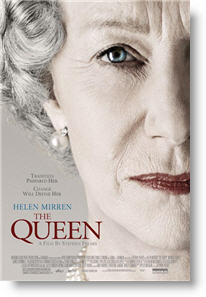
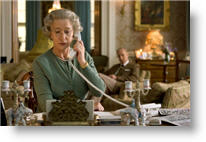
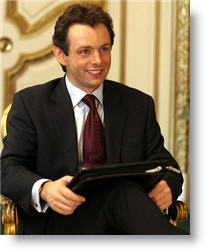
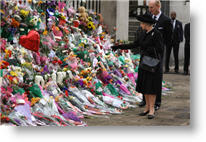
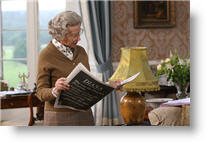
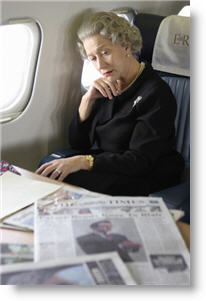
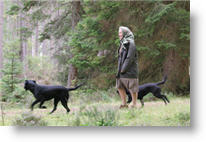
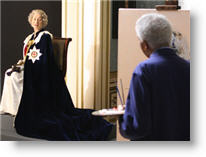
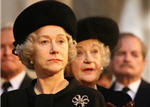

The movie is intelligent enough not to turn Mirren’s character into a villain. She is simply a woman who is doing what she feels is the right thing to do in a circumstance like this. Agree or Disagree she has her point of view which she justifies and is entitled to just like the people of England had their view.
For example, when it is debated whether or not to fly the royal flag at half staff Prince Charles says that they should do the extraordinary circumstances but it is also pointed out that the flag never has flown at half staff for the death of a royal so why should this be any different. The movie doesn’t say whether either side is the correct side, it simply states that one must consider all arguments. This is a brilliant film, and I walked out of the film with more respect for the queen of England than when I walked in. I didn’t always agree with her, but at least I understood where she was coming from.
My Ratings: Good / 5